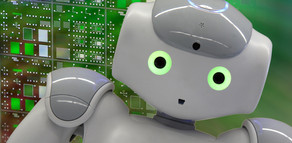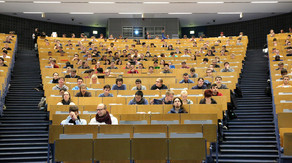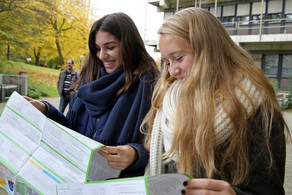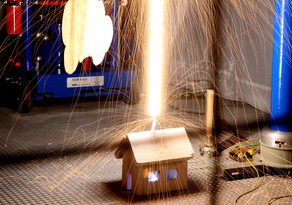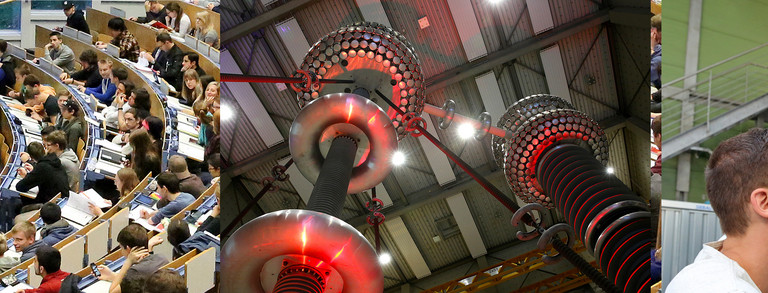Description of the Program and Major Fields
Information abstract
Degree: Master of Science (M.Sc.) in "Automation and Robotics"
Teaching Language: Englisch
Duration of Program: 2 years including 6 month thesis work
Intake: October each year
Tuition fees: none
Social insurance (incl. public transportation): 299,22€ per Term, starting Octobre 2019
The M.Sc. Automation & Robotics Program is interdisciplinary and convers all relevant areas which contribute to this field. This is accomplished by valuable contributions of many faculties, namely the Elektrotechnik und Informationstechnik (EIT), Maschinenbau (ME), Informatik(CS), Bio- und Chemieingenieurwesen (BCI), Mathematik (Math). As a surplus, renowned research institutes as the Institut für Roboterforschung (IRF) and the Fraunhofer Institute for Logistics (IML) contribute to the educational offers in the program.
The first study term comprises basic subjects, intended to install a high common knowledge level for all students which may have their roots in different parts of Engineering. The next two terms are dedicated to eligible subjects which each student may select in favor of own interests and toward the selection of a major in the framework of the module structure of the course: Robotics, Process Automation or Cognitive Systems.
Each major makes some modules mandatory while the others can be used a supplementary. A variety of lab courses and experiments conducted as part of the lecture classes enrich the education and offer plenty of opportunities to get into touch with cutting edge technologies. A major asset in tehh second year of studies is the so called project group which makes the successful team building of group members a must to reach the ambitious goals of these small scale research and engineering projects.
The degree "Master of Science" will then be rewarded when the student has finished the studies by successfully conducting an individual research project in the master thesis which takes about 6 months to complete.
Goals of the program
The ongoing proliferation of automation and control technology is one of the key concepts to exploit new fields of applications, basically i all parts of our daily life. The results of this research branch become visible in the multitude of embedded systems which are nearly ubiquitious, ranging from high end technology products like smart phones or cars to even commodities like fridges or microwave ovens. In an industrial setting modern logistics telecommunication, manufacuring processes or in security systems autonomous controls operate a machinery with ever lowering human interaction.
Automated systems, of what ever kind they may be, have already turned to key components for the success of modern companies. Robots, as a special form of automatons, usually add mechanical and kinematic interaction to the intelligence of the embedded system. They are thus the preferred candidates to take over dangerous jobs or operations in hazardous areas.
The demand of engineers to develop, maintain and improve such systems has been and is growing constantly.
Information and communication technologies support the interconnection of the other main directions of the program. The M.Sc. program "Automation & Robotics" teaches the mandatory prerequisites for a successful carreer in the areas of automation, control or robotics in the IT age.
As a complement to the technical and scientific education so called "soft skills" have a vital role during the education of future engineers. In this regard special courses in the M.Sc. program are designed to enhance project management and communication skills.)
Qualification and professional competencies
The "Mandatory Courses" of the 1st semester, impart basic and advanced methodological knowledge in the following areas: advanced engineering mathematics, control engineering, computer architectures as well as basics of robotics. The modules are supplemented by the practical course "Scientific Programming with Matlab" with an introduction to scientific programming. Since the students' previous knowledge is divergent due to different degrees in different academic cultures, the mandatory modules serve to create uniform prerequisites and knowledge for the further courses. Based on the relevant Bachelor's degree and the specific admission requirements, it is assumed that the students have basic knowledge in mathematics and computer science.
For specialisation, the elective course area offers three specialisations from the 2nd semester onwards: The specialisations in Cognitive Systems, Process Automation and Robotics take up the research foci and curricula of the teaching units of the faculties of Electrical Engineering and Information Technology, Computer Science, Bio- and Chemical Engineering, Mathematics and Mechanical Engineering. In the chosen specialisation, graduates have comprehensive knowledge in the current state of research and technology. With their knowledge they can work in scientific research as well as in the development and conception of automation solutions in industry.
Furthermore, they can research and process scientific literature and present the essential concepts and ideas of this work to colleagues in a clear and understandable way. In addition to the secondary qualifications they acquired during their bachelor's studies, they are able to organize and carry out the processing of an extensive engineering task in a team. The individual acquisition of knowledge in one of the specialisations promotes the students' ability to develop new concepts within their field of study and to independently work on and implement them, e.g. in a master thesis oriented towards current research topics.
With their degree, graduates possess knowledge, know-how and experience in the application of scientific methodology and thus possess the basic academic qualification for a subsequent doctorate.
Career opportunities
Engineers with a degree in M.Sc. A&R affiliate with research and development as well as in design of production in a wide range of companies for automobile, chemical to avionics industries and in many other fields.




